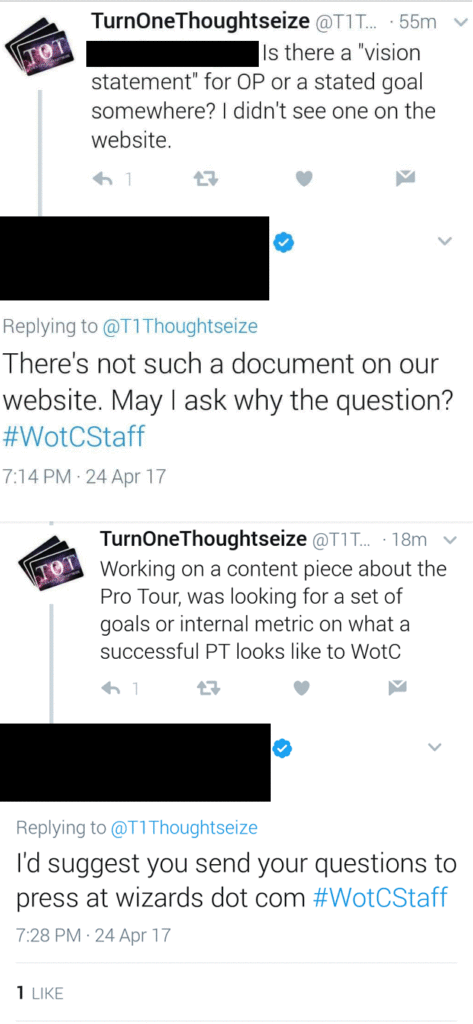by Ahren Gauthier
Hold on. Put Chris Pikula in the Hall of Fame, then cancel the Pro Tour.
I can hear the wailing and gnashing of teeth already. “You’re just jealous,” “There’s always been a Pro Tour,” “Don’t take it away, it’s my dream!” Stick with me, I have a plan.
Why is there a Pro Tour in the first place?
First things first: Why does the Pro Tour exist? Much to my dismay, I haven’t been able to get an answer to that question from Wizards. Organized Play (OP) referred me to Press. Press didn’t respond.

Let’s extrapolate from conventional wisdom: The Professional Tour is a way for the most serious players to compete at a high level for large prizes.
Alternatively known as the “Promotional” Tour, it additionally serves to showcase the newest sets, provide a goal for players to aspire to, and provide a Twitch-ivised experience to entertain current players and bring in new fans.
Does the Pro Tour achieve these goals?
Yes and no.
The Pro Tour certainly attracts the most serious players. To a person, anyone qualified for the Pro Tour is talented, tenacious, well-practiced, and deeply invested in the game. However, people tend to behave according to incentives. With only four major tournaments a year, players are heavily incentived to spend two weeks testing to try and break the Standard format. Broken decks, when they do happen, don’t create a compelling viewing experience and reflect poorly on the game.
Despite the massive amount of talent on the Pro Tour, the prize purses themselves are miniscule compared to top tier eSports: $250,000 vs. $2 million+ for something like League of Legends. This is even more egregious given the staggering disparity in barriers to competitive play between them. Pro Magic requires a lot of travel. After taxes, travel expenses over the course of the year to qualify and practice vs tiered opponents, and the cost of physical and digital copies of cards, a PT *winner* will probably net $8k or less for a year of work. Is that a reward that inspires?
Twitch coverage is also a mixed bag. Though the production values are much improved, the game is inscrutable to a casual observer and coverage struggles to convert new players. Furthermore, the under/non-moderation of chat is a disgraceful stain on the public presentation of the Magic brand.
There’s another way: qualification ladders leading to Worlds
Pointing out a problem without a ready solution is not my intent and fortunately there is already a constellation of underutilized programs that fit the bill perfectly: Nationals and Worlds.
PPTQs become Regional Qualifiers.
RPTQs become National Qualifiers.
GPs become Open National Qualifiers.
They all feed Nationals.
Nationals feeds Worlds.
Worlds determines World Champion. A singular, comprehensible pipeline for competitive play.
Yes, this borrows heavily from other eSport tournament qualification structures, but those other eSports have proven far more successful than Magic, so why not emulate them?
Qualification ladders reward mastery and beating the metagame, not breaking the format.
The current Pro Tour heavily emphasizes a single tournament over all else and heavily skews the rewards towards players who can spike a single tournament.
A season-long tournament ladder, on the other hand, requires that players constantly reevaluate their deck choice and try to attack an established metagame. Such a structure would reduce the advantage of, and incentives to create, groups of pros that can spend an intense two week period doing nothing but testing ahead of a single, all-important tournament.
Instead, a ladder structure would reward skilled deckbuilders like Brad Nelson, who are able to expertly attack the metagame, as well as players that master their deck and use that advantage over a series of tournaments.
Easier to attract advertisers and increase prizes
Streamlining the marquee event structure is essential to attracting advertisers, which is the most obvious source of money to dramatically increase prize purses.
Imagine trying to explain the current Pro Tour structure to a prospective advertiser. The conversation would be over before you were done explaining the difference between a PPTQ, RPTQ, PTQ, GPT and a GP. Byzantine structures are very unattractive to advertisers because they tend to cloud return on investment, which drives ad spending.
The alternative structure proposed here can be pitched in three sentences: “Sponsor the World Championship M:tG Circuit. Hundreds of thousands watch, tens of thousands play. We crown one winner.”
A clear tournament structure improves the Twitch experience for new players
An easy-to-understand ladder structure allows event coverage to become part of the new player onboarding process.
As a Twitch viewer with no knowledge of Magic tournaments, seeing a broadcast titled “M:tG Grand Prix Kyoto” is meaningless. What is a Grand Prix? Why is it important? How important is it? Compare that to a broadcast titled “M:tG National Championship Qualifier.” This makes much more sense to an uniformed viewer because it places the event in context (Nationals Qualifier) and sets the stakes (the winner qualifies for Nationals).
Combine this with improved broadcast production values and the easy narratives that come with tournament ladders, and Magic will be in a better position to attract viewers and convert them into players.
We are already seeing hints of this kind of change
Well, not a full-on transition to a ladder-style qualification system, but something. Pro Tour Ixalan (first weekend of November) will take place a full five weeks after Ixalan’s official release (last weekend of September) and will thus feature much more mature Limited and Standard formats. This change will refocusing the Pro Tour to reward players who have mastered the formats after more than a month of play, rather than advantaging those who can break the format in its first two weeks.
The change to Pro Tour Ixalan may seem small at first but it could be a small step towards an eventual ladder-like tournament system.
Ahren is the host of the amazing podcast Turn One Thoughtseize.

